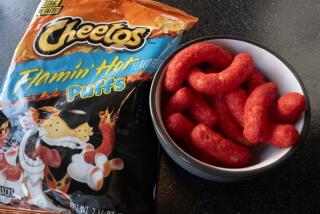Ex-owner of SK Foods indicted in tomato scandal
- Share via
Reporting from Sacramento — A federal grand jury has indicted former SK Foods owner Frederick Scott Salyer on racketeering and six other counts of corruption for allegedly directing a decade-long scheme to quash competition and sell tomato products at inflated prices -- a practice that led to consumers paying more at the grocery store.
Salyer, a member of one of the state’s most powerful farming families, was accused Thursday of violating the Racketeer Influenced and Corrupt Organizations Act, as well as conspiracy, obstruction of justice and four counts of wire fraud. If convicted on all counts, Salyer could face at least 20 years in prison.
Among other things, prosecutors alleged that Salyer, SK Foods’ onetime chief executive, organized and led a conspiracy to use more than $330,000 in bribes from 1998 to 2008 to subvert competition and get deals to sell his company’s tomato paste, peppers and other products to Kraft Foods Inc., Safeway Inc., Frito-Lay North America Inc. and Gerber Products Co., among others.
Salyer, 54, was arrested at John F. Kennedy International Airport in New York on Feb. 5 after he got off a plane from Switzerland. He is expected to appear in federal court in Sacramento next week for a bail hearing and plans to plead not guilty to the charges, defense attorney Malcolm Segal said.
Prosecutors said Salyer had been living in Europe in recent months in order to make arrangements to flee extradition.
Salyer is the eldest son of one of largest land barons in the Golden State’s history. His grandfather Clarence was a West Virginia mule skinner who parlayed a crop loan into an agricultural empire of more than 65,000 acres, an area twice the size of Long Beach. The Salyers were kings of cotton in the Central Valley, and earned a reputation for ruthless business dealings with politicians, outside rivals and family members alike.
Nearly 95% of all tomatoes grown in the U.S. are processed by four California firms. SK Foods, with its two Central Valley plants, was one of these tomato giants. When the investigation of SK Foods began in 2007, the company controlled 10% to 20% of that market, according to prosecutors.
Prosecutors claimed that Salyer and other SK Foods officials tricked food makers into buying a lesser-quality tomato paste -- which had been mislabeled to appear of a higher grade -- and then shut out rivals on deals with big processors and supermarket chains.
In the end, prosecutors say, the conspirators were able to sell the paste at a markup of 30% or more. For the plan to work, Salyer allegedly directed that some employees of the company’s customers be bribed to take the orders and look the other way.
Since December 2008, 10 people have pleaded guilty in the federal probe of SK Foods. And like the charges outline in the indictment of Salyer, the pleas are to offenses typically associated with organized crime: racketeering, collusion, bribery, money laundering and bid-rigging.
Six of the people worked for SK Foods; four were employed by its customers. SK Foods’ sales plunged as the case unfolded. It was sold out of Bankruptcy Court last year to a Singapore firm.
The most recent plea also came Thursday when Steven James King, the former manager of the company’s processing plants in Williams and Lemoore, Calif., pleaded guilty to falsifying food-quality documents.
Salyer said he is being wrongfully blamed by corrupt employees at SK Foods and its customers who are trying to get reduced sentences, Segal said.
“There was no way on God’s Earth that [Salyer] had the time or the willingness to participate with these individuals in criminal activity,” Segal said.
But at a news conference at the federal courthouse in Sacramento, prosecutors painted a portrait of an arrogant man whose own greed spread throughout the company and inflated the price of everything from salsa to tomato soup to baby food.
“The investigation has exposed a web of corruption and fraud in the tomato products industry, centered at SK Foods,” said Benjamin B. Wagner, the U.S. attorney in Sacramento whose office is spearheading the case.
Besides the RICO violations, the grand jury also charged Salyer with obstructing justice by altering the minutes of a board of directors’ meeting to hide a connection between SK Foods and a director who had already pleaded guilty to racketeering, money laundering and other charges as part of the probe.
Fraudulent practices in the food sector are a long-standing problem; they include processors or distributors misbranding products or conspiring to inflate prices that trickle down to the consumer, said John Spink, a food-fraud expert at Michigan State University. But most people aren’t aware that such practices happen and don’t even think to look out for them, he said.
“Food used to be moved around regionally,” Spink said. “Now, there’s so much product moving so fast around the world and little oversight, particularly in other countries. Fraud in food has become a small side-effect of globalization.”
p.j.huffstutter @latimes.com
More to Read
Inside the business of entertainment
The Wide Shot brings you news, analysis and insights on everything from streaming wars to production — and what it all means for the future.
You may occasionally receive promotional content from the Los Angeles Times.






